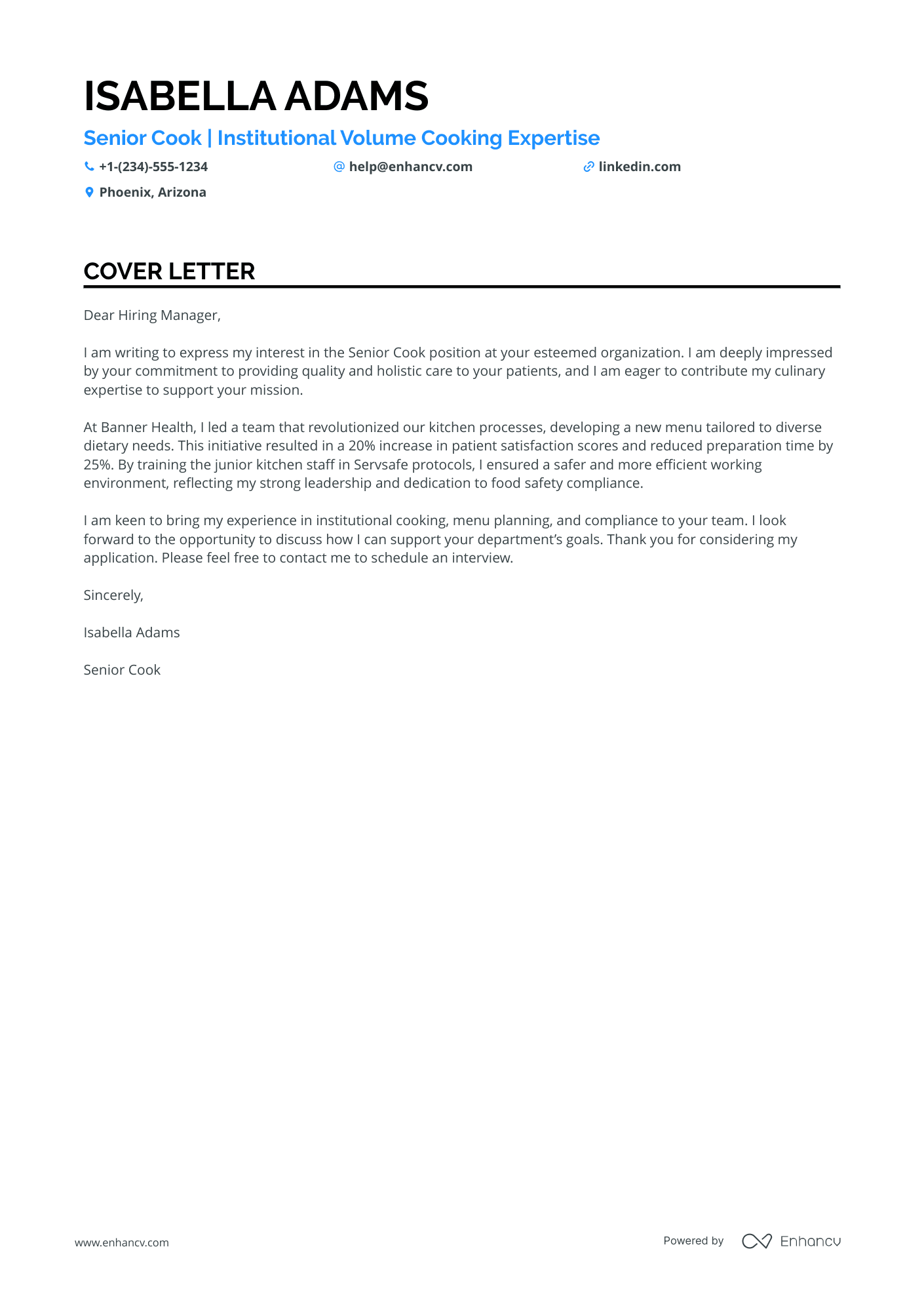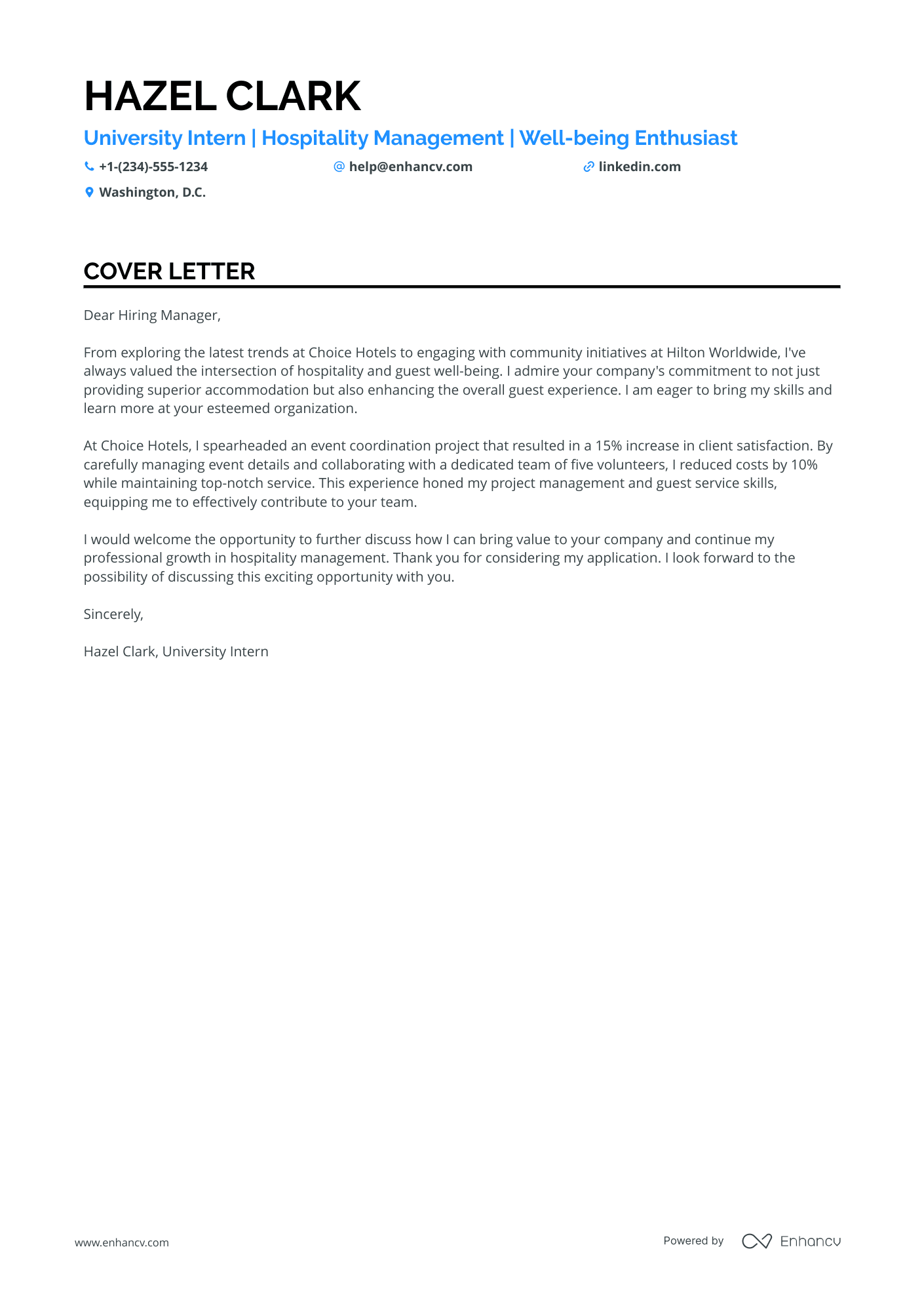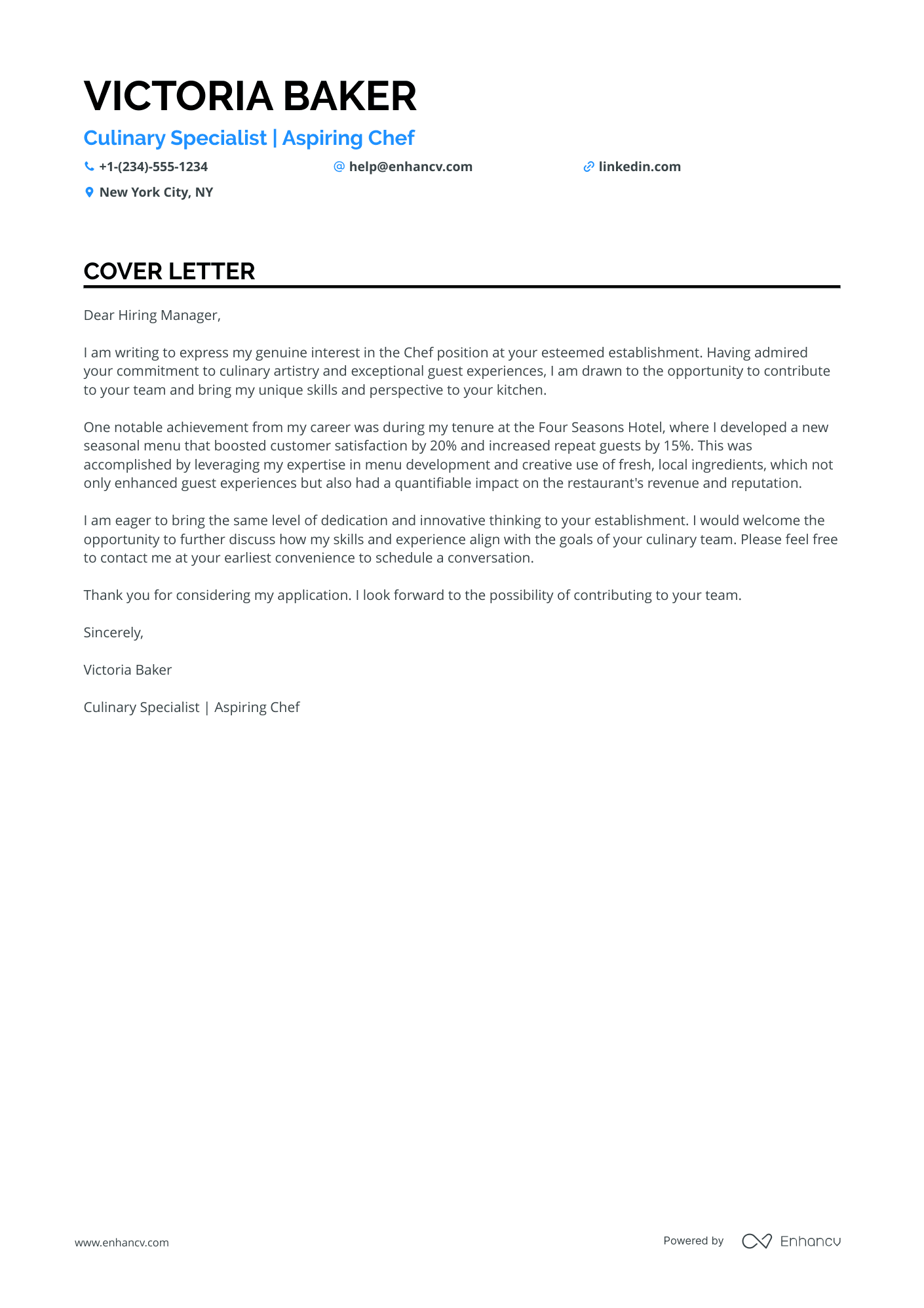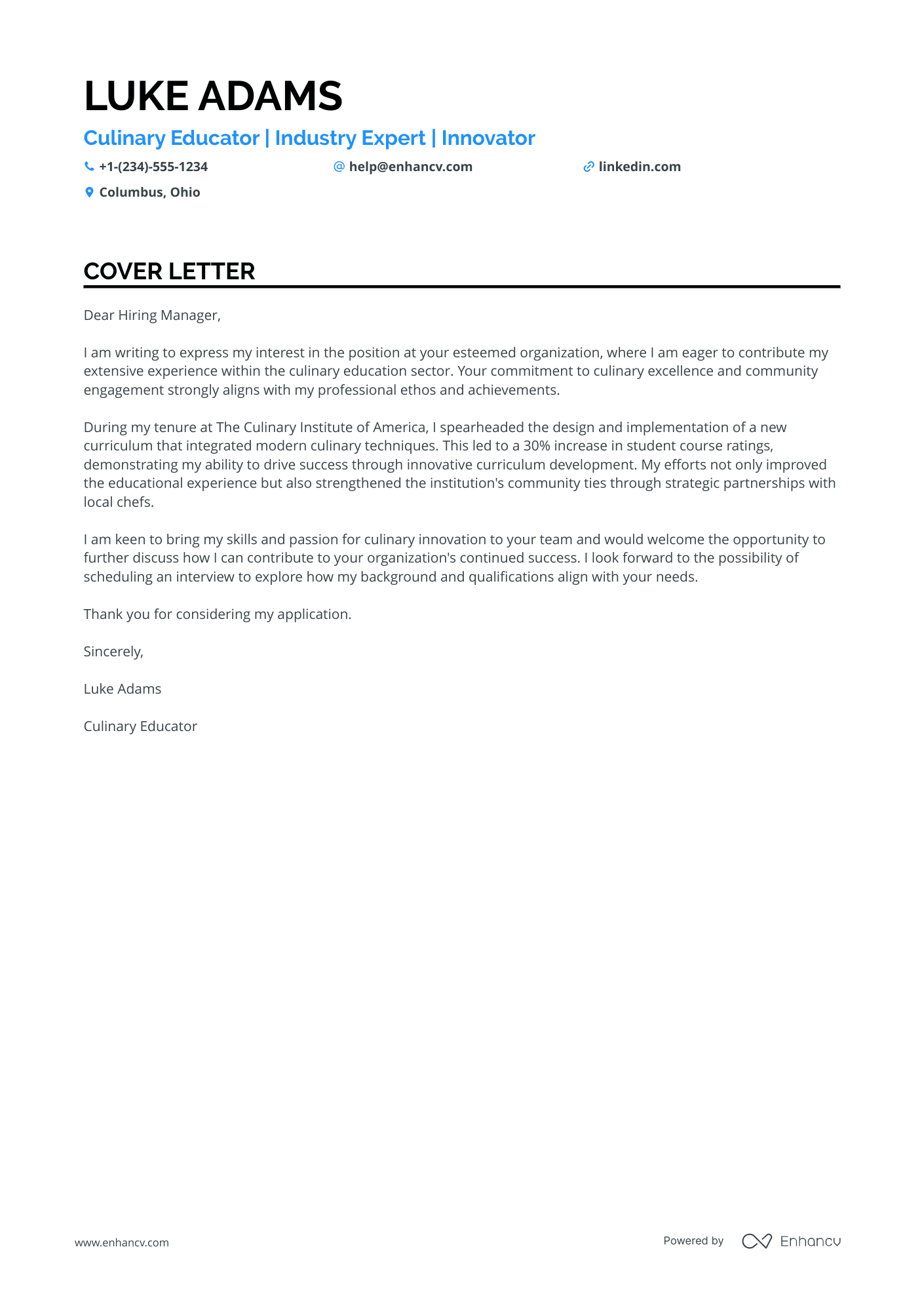Embarking on your culinary career journey, you might find yourself face-to-face with the daunting task of crafting a cover letter. It's not just a formality—this is your shot to dish out your most savory professional success, without simply reheating the contents of your resume. In your quest to stir interest, remember: stay clear of worn-out phrases, keep it concise within a single page, and let the authentic flavor of your unique story tantalize the reader's palate.
- Making excellent use of job-winning real-life professional cover letters;
- Writing the first paragraphs of your culinary cover letter to get attention and connect with the recruiters - immediately;
- Single out your most noteworthy achievement (even if it's outside your career);
- Get a better understanding of what you must include in your culinary cover letter to land the job.
Let the power of Enhancv's AI work for you: create your culinary cover letter by uploading your resume.
If the culinary isn't exactly the one you're looking for we have a plethora of cover letter examples for jobs like this one:
Drop your resume here or choose a file.
PDF & DOCX only. Max 2MB file size.
Culinary cover letter example
Sophia Brown
Denver, Colorado
+1-(234)-555-1234
help@enhancv.com
- Demonstrating Relevant Experience: The cover letter references the candidate's past leadership role at The Modern in New York, which showcases their ability to manage a sizable team and create successful menu changes. Highlighting such experience underscores the candidate's suitability for the Executive Chef position which requires similar responsibilities.
- Quantifiable Achievements: Mentioning specific achievements like reducing preparation times by 30% and increasing customer satisfaction by 25% provides concrete evidence of the candidate's impact and effectiveness in their previous roles. This approach conveys competence and the potential to deliver measurable results.
- Motivation and Fit: The candidate expresses enthusiasm for the role and aligns their passion with the values of the restaurant. This helps establish the candidate's genuine interest and indicates that they are likely to be a committed and motivated addition to the team.
- Offer to Continue the Conversation: By welcoming the chance to discuss how their background, skills, and commitments can contribute to the culinary team, the candidate opens the door for further communication, demonstrating their proactive stance and willingness to engage in dialogue about the opportunity.
The visual appeal of your culinary cover letter: format, font, and structure
When using our cover letter builder, make sure to include these vital sections:
- Header (with your name, contact details, the role, and date);
- Greeting (that's personalized to the recruiter);
- Introductory paragraph (to capture attention);
- Body paragraph (to tell a story of how you've obtained your job-crucial skills);
- Closing paragraph (ending with a nod to the future ahead);
- Signature (that is not a must).
Our cover letter templates are already set up for you with the best culinary cover letter design with single-spaced paragraphs and a one-inch margin.
As for the font of your culinary cover letter, use the same one as you did in your resume (where modern and simple fonts, like Rubik and Bitter, take precedence over Arial and Times New Roman).
Your culinary cover letter is created with the recruiters in mind - as no Applicant Tracker System looks over this part of your profile.
When sending over your culinary cover letter, download it in PDF. This format allows your information and design to stay intact and to keep the same visual quality.
Pressed for time? Use our free cover letter generator to turn your resume into a cover letter effortlessly.
The top sections on a culinary cover letter
- Header: Contains your personal contact information, the date, and the contact details of the hiring manager, which sets the professional tone and makes it easy for the recruiter to know who you are and how to reach you.
- Greeting: Personalized address to the hiring manager or the recruitment team showcases your attention to detail and respect for the recipient, and helps to create a personal connection right from the start.
- Introduction: Introduces who you are, the position you're applying for, and gives a snapshot of your passion for the culinary field, which helps to catch the recruiter's attention and convey your enthusiasm for the role.
- Professional Experience and Skills: Highlights your relevant culinary experience, specific skills, and achievements that align with the job description, thus demonstrating to the recruiter why you are an excellent fit for the role.
- Closing and Call to Action: Summarizes your interest in the position, expresses gratitude for considering your application, and includes a proactive call to action, inviting the recruiter to contact you for an interview, which reinforces your eagerness to become part of their culinary team.
Key qualities recruiters search for in a candidate’s cover letter
- Proven ability to develop and execute menu items that satisfy a range of customer preferences while maintaining cost efficiency
- A strong understanding of food safety regulations and a track record of maintaining high standards of cleanliness and hygiene in the kitchen
- Excellent leadership skills, with experience in managing kitchen staff and fostering a collaborative atmosphere
- The capacity for creative problem-solving and innovation in the kitchen, especially during high-pressure situations or when faced with ingredient limitations
- Experience with inventory management, including ordering supplies, minimizing waste, and optimizing kitchen operations for financial performance
- A commitment to continued education and staying current with culinary trends, techniques, and cuisines to enhance the dining experience
What greeting should you use in your culinary cover letter salutation
A simple "Hello" or "Hey" just won't work.
With your culinary cover letter salutation, you set the tone of the whole communication.
You should thus address the hiring managers by using their first (or last name) in your greeting.
But how do you find out who's recruiting for the role?
The easiest way is to look up the role on LinkedIn or the corporate website.
Alternatively, you could also contact the organization via social media or email, for more information.
Unable to still obtain the recruiter's name?
Don't go down the "To whom it may concern path". Instead, start your cover letter with a "Dear HR team".
List of salutations you can use
- Dear Hiring Manager,
- Dear [Title of the person. e.g. Chef, Executive Chef, Sous Chef, Hiring Committee,]
- Dear [Full Name of the Hiring Manager or Chef],
- Dear [Mr./Ms./Mrs. Last Name],
- Attention [Name of the Restaurant or Kitchen Team]:
- Esteemed Selection Committee,
Using your culinary cover letter intro to show your dedication
We know just how difficult it is to start writing your culinary cover letter introduction.
There are so many great qualities you have as a professional, which one should you choose?
How about writing up to two sentences about your passion and commitment to the work you do or are set to do?
Try to describe exactly what you enjoy about the potential role.
A positive attitude from the get-go will help you stand out as a motivated culinary professional.
How to write an achievement-focused culinary cover letter body
We've got the intro and greeting covered. Now, comes the most definitive part of your culinary cover letter - the body.
In the next three to six paragraphs, you'd have to answer why should recruiters hire you.
What better way to do this than by storytelling?
And, no, you don't need a "Once upon a time" or "I started from the bottom and made it to the top" career-climbing format to tell a compelling narrative.
Instead, select up to three most relevant skills for the job and look back on your resume.
Find an achievement, that you're proud of, which has taught you these three job-crucial skills.
Quantify your accomplishment, using metrics, and be succinct in the way you describe it.
The ultimate aim would be to show recruiters how this particular success has built up your experience to become an invaluable candidate.
Thinking about the closing paragraph of your culinary cover letter
Before your signature, you have extra space to close off your culinary cover letter.
Use it to either make a promise or look to the future.
Remind recruiters how invaluable of a candidate you are by showing what you plan to achieve in the role.
Also, note your availability for a potential next meeting (in person or over the telephone).
By showing recruiters that you're thinking about the future, you'd come off as both interested in the opportunity and responsible.
What could you write about in your culinary cover letter when you have no experience
Candidates with zero professional experience often struggle to write their culinary cover letter.
You may lack experience, but your application could still be impressive when you focus on your strengths.
Consider your most relevant talents (and/or one achievement) that align with the role and help you stand out.
Perhaps you spent every summer volunteering at your local dog pound - think of the job-relevant skills this experience taught you.
Sharing your tangible career goals is another good strategy to stand out.
Key takeaways
Writing your culinary cover letter has never been easier, so remember to:
- Select a culinary cover letter template that automatically meets industry formatting (e.g. has one-inch margins, is single-spaced, is in PDF, etc.);
- Make your culinary cover letter personal by mentioning the recruiters' first or last name;
- Within the introduction, describe what you like best about the company in no more than two sentences;
- Use your culinary cover letter body to tell a story of your greatest achievement, backed up by job-relevant skills and technologies;
- If you have no professional experience, be honest about it in your culinary cover letter, but also write about your unique talents.
Culinary cover letter examples
By Experience
Culinary Assistant
- Emphasize leadership experience: The letter highlights the candidate's ability to lead a team and improve kitchen processes, which is crucial for a Senior Cook role.
- Showcase specific achievements: Mentioning the 20% increase in patient satisfaction and 25% reduction in preparation time demonstrates a tangible impact on past work environments.
- Discuss safety compliance: The candidate’s focus on training staff in Servsafe protocols reflects their commitment to maintaining safety standards, essential in healthcare settings.
- Express alignment with organizational values: Showing enthusiasm for the hospital’s mission to provide quality care aligns the candidate's goals with the organization’s objectives.
Culinary Intern
- Emphasize relevant experience, such as previous work at notable companies (e.g., Choice Hotels, Hilton Worldwide) to showcase industry familiarity.
- Highlight specific achievements and measurable outcomes (e.g., 15% increase in client satisfaction, 10% cost reduction) to demonstrate problem-solving and effectiveness.
- Showcase teamwork and leadership skills by mentioning the management of a team, as these are vital in hospitality roles that often require collaboration.
- Express enthusiasm for the company’s values and mission, indicating alignment with the organizational culture and goals.
Culinary Apprentice
- Highlighting specific achievements and quantifiable results, like increased customer satisfaction and repeat guests, showcases the candidate's ability to make impactful contributions.
- Demonstrating familiarity with the establishment's values and ethos—such as commitment to culinary artistry and guest experiences—indicates genuine interest and alignment with the prospective employer's goals.
- Mentioning experience in menu development and using fresh, local ingredients emphasizes relevant skills and creativity, which are crucial in a chef's role.
Culinary Trainee
- Alignment with Organization's Values: The cover letter specifically mentions the applicant's alignment with the organization's focus on culinary excellence and community engagement, which helps in establishing a strong connection with the employer's mission.
- Quantifiable Achievements: Highlighting a significant 30% increase in student course ratings shows a concrete and measurable impact, which can appeal greatly to potential employers by illustrating the tangible benefits the applicant can bring.
- Innovation and Curriculum Development: Mentioning the design and implementation of a new curriculum involving modern culinary techniques demonstrates the applicant's forward-thinking and ability to adapt to evolving trends, which is valuable in educational roles.
- Community and Industry Engagement: Creating strategic partnerships with local chefs indicates proactive industry engagement and community involvement, enhancing the institution's reputation and providing students with real-world connections and experiences.













